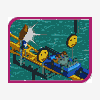-
 RCTyrant
Go to post #243626
RCTyrant
Go to post #243626
Most likely Rolla if I get that scholarship, otherwise I might find a fairly cheap school out of state. See, the only problem is that I have no clue if I really want to be an engineer--I know I do well in math and physics, though--and I don't really want to go to a big school either, so um, yeah. That's my biggest dilema.
At Rolla you don't delcare your major untill Sophmore year, freshman year you take the basic history, math, english, and Chem classes. The two classes that really expose you to engineering are BE 110 which is Basic Engineering, for one day a week people from the various departments come and talk about their degree program; and IDE "Intro to Design Engineering" which does group projects, 3d modeling, CAD stuff, etc.. If you find that you really don't like it, it isn't hard to back out and go somewhere else. Almost to your advantage too, since you will have taken the basic classes that you would have to take at other colleges, thus not having to take them again.
I signed up for my freshman classes last week at PRO orientation, I am starting out with an 18-hour course load, but I plan on taking English 20 over the summer, and I think I can get out of BE110 because I did an "Intro to Engineering" camp the past two years at Rolla.
Talk to me on AIM if you have any other questions about Rolla or whatever. -
 RCTyrant
Go to post #243453
I got a 31 on my ACT after taking the test twice before, and getting a 26 and a 28.
RCTyrant
Go to post #243453
I got a 31 on my ACT after taking the test twice before, and getting a 26 and a 28.
And I did end up qualifying for Bright Flight, I am now getting $2,000 per semsester as long as I keep my grades up.
Penguin, where you going to college? It must be a Missouri school right? I am going to the University of Missouri Rolla for Mechanical Engineering... -
 RCTyrant
Go to post #240075
University of Missouri at Rolla for Mechanical Engineering.
RCTyrant
Go to post #240075
University of Missouri at Rolla for Mechanical Engineering.
Already racking up the scholarship money, and since its a state school, a lot cheaper too. Great education though, one of the top engineering schools in the midwest, and a 98% job placement rate
-
 RCTyrant
Go to post #228615
Most "classic" brakes, like Corky stated, use air compression. These brakes are also fail-proof, which doesn't mean that they cannot break, it means that if they do happen to fail, they will do so safely. This is done by having a spring that holds the two fins together, when air flows, it pushes the spring open and lets the train coast through, when air is released, the spring goes back to its original position, and the fins are closed. Now in the event of a failure, the air would automatically be drained from the system (since it has to have a constant pressure) so the brakes would automatically move to a closed position. Hydralic brakes work in the same fashion, but are generally smoother and a lot easier to control than air pressure because a fluid is being used. With the air pressure systems, the brakes are normally only in two positions, "on" or "off" but with hydralic brakes, since a fluid is used, it allows for greater control, so parabola curves and stuff can be used to bring a train to a stop smoothly.
RCTyrant
Go to post #228615
Most "classic" brakes, like Corky stated, use air compression. These brakes are also fail-proof, which doesn't mean that they cannot break, it means that if they do happen to fail, they will do so safely. This is done by having a spring that holds the two fins together, when air flows, it pushes the spring open and lets the train coast through, when air is released, the spring goes back to its original position, and the fins are closed. Now in the event of a failure, the air would automatically be drained from the system (since it has to have a constant pressure) so the brakes would automatically move to a closed position. Hydralic brakes work in the same fashion, but are generally smoother and a lot easier to control than air pressure because a fluid is being used. With the air pressure systems, the brakes are normally only in two positions, "on" or "off" but with hydralic brakes, since a fluid is used, it allows for greater control, so parabola curves and stuff can be used to bring a train to a stop smoothly.
If you have anymore questions, feel free to ask, I did a summer internship with the corporate engineer of Six Flags St. Louis, and learned a hell of a lot about the technical sides of coasters and engineering, and is what I will be pursuing next year at the University of Missouri - Rolla.



